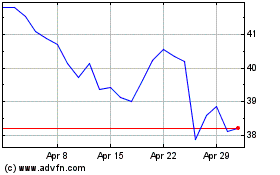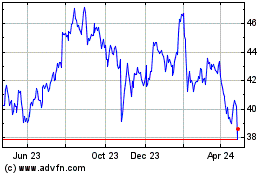Supreme Court to Consider Racial Discrimination Case Against Comcast
June 10 2019 - 4:05PM
Dow Jones News
By Jess Bravin
WASHINGTON -- The Supreme Court said Monday it would consider
whether a black television producer can pursue racial
discrimination claims against Comcast Corp. for declining to carry
his programming channels on its cable system.
The justices also agreed to decide whether landowners near a
Montana superfund site can use state law to require that Atlantic
Richfield Co. restore the Anaconda Smelter property beyond
remediation plans ordered by the U.S. Environmental Protection
Agency.
But the court declined to consider a Guantanamo inmate's
challenge to his indefinite detention without charge, which has
lasted 17 years. Justice Stephen Breyer issued a statement saying
"it is past time" for the court to decide whether "Congress has
authorized and the Constitution permits" keeping enemy prisoners in
"perpetual detention."
The Comcast case stems from the cable operator's decision not to
carry Pets.TV, Recipes.TV and other channels from Entertainment
Studios Networks Inc. The Los Angeles company is solely owned by
Byron Allen, who gained celebrity as co-host of "Real People," a
1980s reality show.
Comcast has carried channels owned mostly or substantially by
African-Americans, such as Magic Johnson's Aspire and Sean "Diddy"
Combs's music channel, Revolt TV, as well as Black Entertainment
Television, whose African-American founder, Robert Johnson, sold to
Viacom in 2001.
The suit, filed under Reconstruction-era law affording "the same
right" to contract "as is enjoyed by white citizens," alleges,
however, that Comcast discriminated against "100% African American"
owned media such as Entertainment Studios.
A federal appeals court in San Francisco allowed the suit to
proceed. "If discriminatory intent plays any role in a defendant's
decision not to contract with a plaintiff, even if it is merely one
factor and not the sole cause of the decision, then that plaintiff
has not enjoyed the same right as a white citizen," Judge Milan
Smith wrote for the Ninth U.S. Circuit Court of Appeals.
Comcast denies the allegations and says it was concerned the
Entertainment Studios programming wouldn't draw enough of an
audience to justify allotting it bandwidth. The cable operator
argues that federal law requires the plaintiff to show that he or
she would have gotten the contract absent racial bias.
In total, the court added four new cases to the fall docket and
decided three from the current term. Still to come as the term
winds down this month are high-profile rulings on partisan
gerrymandering, a citizenship question on the 2020 census form and
the constitutionality of a 40-foot cross in a state-owned traffic
circle.
In a 6-3 decision Monday that saw Justice Sonia Sotomayor depart
from fellow liberals, the court ruled that unlike private parties,
federal agencies may not challenge patents through an
administrative panel created under a 2011 patent-law overhaul.
The decision originated with a complaint from Birmingham,
Ala.,-based Return Mail Inc. that the U.S. Postal Service infringed
its business-method patent for processing undeliverable mail.
The issue before the Supreme Court was whether the Postal
Service was a "person" authorized by the Leahy-Smith America
Invents Act of 2011 to bring disputes to the relatively expeditious
Patent Trial and Appeal Board -- or had to challenge patents
through the courts, which critics consider the legal equivalent of
snail mail.
Precedent suggests that the government isn't a "person," Justice
Sotomayor wrote for the court, joined by Chief Justice John Roberts
and Justices Clarence Thomas, Samuel Alito, Neil Gorsuch and Brett
Kavanaugh. And the Postal Service provided no good reason to
overcome that presumption, she wrote.
Congress had reason to provide expedited treatment for private
parties, she wrote. Unlike government agencies, "other actors face
greater and more uncertain risks if they misjudge their right to
use technology that is subject to potentially invalid patents."
Justice Breyer, joined by Justices Ruth Bader Ginsburg and Elena
Kagan, dissented. He wrote that the reasons Congress created the
appeals board -- to foster innovation by making it easier to weed
out weak patents -- are served by allowing government agencies as
well as private parties to use the expedited process.
Write to Jess Bravin at jess.bravin@wsj.com
(END) Dow Jones Newswires
June 10, 2019 15:50 ET (19:50 GMT)
Copyright (c) 2019 Dow Jones & Company, Inc.
Comcast (NASDAQ:CMCSA)
Historical Stock Chart
From Mar 2024 to Apr 2024

Comcast (NASDAQ:CMCSA)
Historical Stock Chart
From Apr 2023 to Apr 2024
